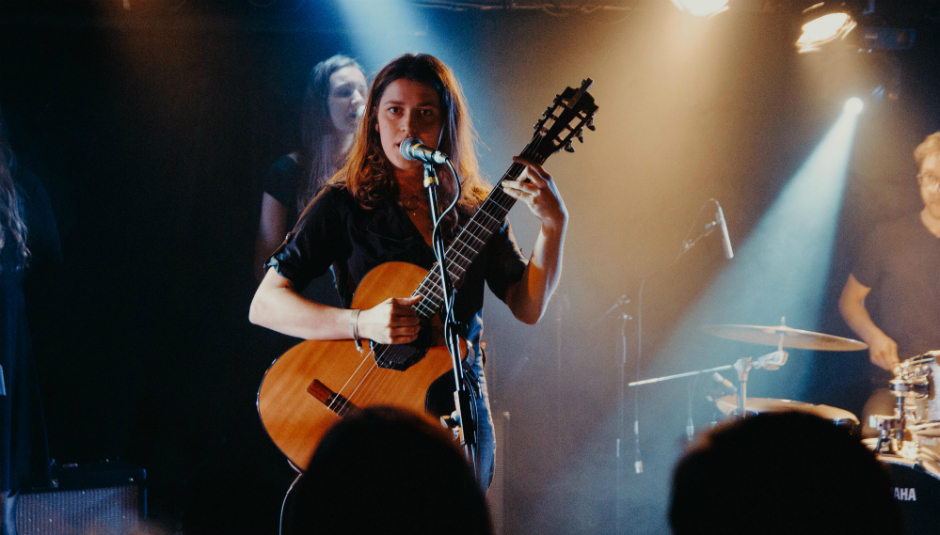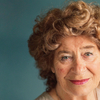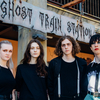Pitou is not your average singer-songwriter. The Amsterdam native did not even discover the world of popular music until her late teens, being weaned instead on classical music. Her time spent in children’s choirs even led to her getting to sing at the baptism of a Dutch Princess.
These days, her love of folk, world, and rock music is in full swing and the melting pot of genres and influences can all be traced on her new record, the beautifully crafted EP I Fall Asleep So Fast, which came out recently on Mink Records.
We caught up with Pitou in Brighton when she was preparing for a show that turned out to be a sell-out at the Unitarian Church, just one of many successes from Dutch artists over the weekend of The Great Escape. The Netherlands was the official international partner of the festival this year, and we spoke to her about the booming Dutch scene, her unconventional musical background, how she uses her songwriting to ensure that she lives in the moment, and how she sees herself developing as an artist.
DiS: We’re speaking in Brighton ahead of your two sets at The Great Escape. Have you played UK festivals before?
Pitou: I played Stag & Dagger [in Glasgow] and Hit the North [in Newcastle] last week, which was nice. Other than that, I don’t think I have. I did play in St. Pancras Old Church in London once and in Glasgow in a church before.
Nearly all churches!
Yes! Which is funny because at first I really wanted to get away from the folky, angelic thing. But now I feel more confident about what I make so I’m not really afraid of stereotypes anymore. Stereotypes are there for a reason and you just have to accept that what people write and say about you is something completely different to what they actually feel when they see you live.
The Netherlands is the official international partner of The Great Escape this year. Do you feel like a part of a gang of Dutch artists invading Brighton?
I do feel like part of a gang, and although I haven’t seen many of the other Dutch artists, I do know them. For instance, we were looking for a snare stand, and I could just text the other Dutch bands because I know them. That’s fun. I wish them all good luck with their shows. The Dutch music scene is quite small, there are maybe one or two bands that I haven’t met. Holland is very small, like a quarter of the UK? So you play the same venues, have maybe the same booker.
Do you think there’s less of a barrier these days anyway between countries for musicians and artists?
Yeah, it would have been much harder twenty years ago. It’s definitely easier. A couple of years ago Holland still had some stigma – Scandinavia was cool, but Holland and Germany maybe not so cool. That’s a feeling that I know a lot of Dutch people always had, but I think that’s beginning to dissolve. There are so many good Dutch artists – I really like what Naaz is doing, and there’s a beautiful band called Luwten that are beginning to get attention – but I don’t really keep up with Dutch artists necessarily.
And that’s the point, we just listen to music without thinking about where it comes from now.
Exactly. The only thing I did notice was on Spotify’s recommended artists, for me, it only gives other Dutch artists whose music couldn’t be further away from the music that I make. There’s some improvement to be made there! “Oh you’re Dutch, we’ll put you in the Dutch box, you all sound alike!” Other than that, it’s all fine. At the beginning, I was worried that the UK audience would wonder why I was singing in English and sometimes the older generation in Holland ask that too. It’s like they’re a little bit hurt and I completely agree that Dutch is a beautiful language, I love reading Dutch literature, but if you sing in Dutch your audience is minimised to people who live in Holland and the one person who thinks that it’s fun, odd music and they don’t care about the language. Anyway, so much of what I read and see on TV and in movies is in English, so it makes sense.
This is a big week for you, your EP I Fall Asleep So Fast came out last Friday (11 May). Is it exciting or nerve-wracking?
It’s very exciting. I’m very happy that she’s finally out there! I had the first EP and I’m still very happy with it, but it’s very sober and very minimal and every extra vocal was mine. Now I have extra people on there and I’m very happy about that. After the first EP I started performing with other singers and suddenly I loved the way the voices mixed and the texture it gave the music. So now I’ve incorporated that into the new record. I hadn’t recognised before what a beautiful sound that is and how much it adds. It’s like having the same guitar played five times or having five completely different guitars.
Do you feel like a different person now compared to the person who made the first EP?
I look back at the time that I made the first EP and I was very aware that it would be a collection of songs I’d written up to that point which I needed to get out so that I had made my first thing. I knew if I waited until I had the perfect end product, I’d be waiting another twenty years, so I knew I’d be looking back on it thinking that I was very different back then. I just needed to get something out.
You also have to capture that person whilst they’re still there. If you wait, you never get that person back.
Yeah exactly. It needed to be there to evolve. It feels like I’ve started this journey and now everything I do is part of that journey, instead of just waiting for the perfect end goal. I can be insecure if I think too much about the stuff I make, so I worked on my confidence, but I started to realise that I don’t need to be that confident, I just need to make stuff and not analyse it too much. Just do it and the confidence might come later! Don’t wait for the confidence to come before making stuff.
The title track of the EP is beautiful. It could be read more than one way than one way. The refrain at the end, “With no-one to wake me up again”, could go either way.
I always like that you can read a song in a lot of ways and that people can take from it what they need at that point in their life, so I don’t want to ruin that for anyone. But for me, the song is about the fact that I am afraid to fall asleep, in the sense that I engage in a conversation or listen to a song without actually being there, which I think happens to everyone sometimes. You lie in bed and realise, “Oh, I was walking the Earth today but I wasn’t really in the moment”. And that’s okay sometimes, but I’ve had periods where that happened for a month and the shitty thing was I didn’t realise it when I was lying in bed but only after several weeks, when I suddenly heard a song and it felt like, “Whoa, this is what I’m capable of feeling!”. This moment of waking up is a really happy moment but it also scares me, because when I’m asleep, you’re not aware that you’re sleeping. So I thought if I write a song about it, it might happen less to me and I’d be more aware of it.
Has it worked?
I haven’t had any periods of sleep since I wrote it, which is good!
Is the song ‘Give Me a Glass’ as simple as a celebration of alcohol?
At first, it was, but the meanings of songs change for me. It was one of those songs that came to me quite quickly. I don’t have it so much anymore, but a few years ago I was often found myself in a situation, but I was watching the situation as if from above rather than actually being in it. And not in a nice spiritual, groovy way, but in the sense of constantly analysing the situation. In those days, alcohol would always take that layer off and I could actually be in the situation. At this point in my life, I don’t need alcohol for that anymore – in fact, if anything it actually takes me out of the moment now. So ‘Give Me a Glass’ could be just ‘Give Me Life’ now, it doesn’t have to be alcohol.
Do you notice that you get the same comparisons coming up all the time in pieces that are written about you, and do you agree with them?
I sometimes see Joni Mitchell, and obviously you have the woman and the guitar and the voice that goes up really high, and I admire her deeply, so I don’t think that’s a bad comparison at all. And Laura Marling as well, she was one of the artists that got me interested in playing the guitar myself. I started out as just a singer in a choir, but then I saw these women play their guitars and the feeling of independence of just walking in somewhere and being able to play a song and make something all by yourself was what got me interested in playing guitar. I’m not a gear freak at all, the guitar is just a way of being independent. But these comparisons are only a little bit useful, in the same sense that if you’re in a supermarket and you’re looking for a fruit, you’d probably go to where the other fruits are. But you might really like pineapples and be really disgusted by bananas.
I read that you didn’t become interested in pop music until you were 17?
I was a late bloomer, so to speak! I was into classical music. My parents weren’t very interested in pop culture, they grew up with The Beatles and so on, so for them that was old news and they got into world music and other things. They travelled a lot, so built their music collection that way. So I really loved classical music and I sang in a choir until I was fifteen. And then around sixteen, I started hanging out with different people in my high school who had different taste, so that’s when it started to come in. And then I started the investigation myself – I started with B.B. King because I had no idea where to start! And then The Beatles and more folky things after that. I still feel like I’m a rookie a little bit sometimes, there’s so much stuff to discover.
Do you think your years of being into classical music influence the way you write now? You can definitely hear it on ‘Be Delicate’, amongst others.
Yeah, definitely. The love for vocal harmonies and chords. A chord is such a magical thing and I can’t get enough of that. There was a pre-conservatory school that I went to on Saturday afternoons for two years and it was my first time in a band. Some musicians were very meticulous about the chord they were playing and others who used the chord to say what they wanted to say, maybe by putting lots of reverb or effects on it. I would like to have my interest in that sparked more than it is now, but as soon as you put effects on something, I just want to hear what’s happening. Not that reverb isn’t a thing in classical music, obviously. But I just love voices mixing together and the fact that it’s been done for such a long time. We have the middle ages songs and Gregorian chants. I feel like a spokesperson for Le Mystère des Voix Bulgares, I talk about them in every interview. I think that is the music that has hit me hardest, and I can’t understand the lyrics. The voices together, and then one goes half a tone lower and you go [Pitou sharply inhales and her face lights up in delight].
Do you think the classical background gives you an advantage over other songwriters?
No, because other people know so many other artists that I don’t know. I feel like I discover brilliant bands every week. I’m very happy to have been introduced to classical music at such a young age, and I’m happy I get to use it in my music now.
You sang at the baptism of Princess Amalia of the Netherlands, tell us about that.
Yeah, we were one of the children’s choirs in Amsterdam and every year we did the Matthaus-Passion in the Concertgebouw, and I can’t really remember it, but I do remember the thrill of being on the stage and being with the full adult choir and the huge organ. I always think I had a non-interesting background when I read other people’s autobiographies, so I don’t think of it as being weird at all!
What’s next for you?
I’ve always lived in Amsterdam, so I’m going to move to Antwerp in Belgium for a couple of months this summer and work on my music. I have quite a few songs lined up already, but they’re all still very rough. I have two empty months so I’m just going to work on those and approach songwriting differently. I’m looking forward to devoting time to working on them instead of waiting for divine inspiration. I’ve found that at this time in my life the best approach to making music is not to sit and think about what it should sound like, but just to do it. And if it doesn’t work, I just wasted two months, it’s not a big deal.
Do you set yourself goals?
No. When you start out, people ask this, especially bookers and managers. For them, it’s important to work with someone who has goals, because they think then the artist is driven. But you can be driven without major goals. The only major goal I have is to plan it all in the way that I am already doing it. It’s already happening more quickly than I expected. So I just have small goals – just finish this song, move on to the next one. Big goals can become too distracting and can get discouraging. I could set a goal for ten years ago, but I don’t know what kind of person I’m going to be then! It’s better to leave the goals for ten years in the future for the person that I will be then.
I Fall Asleep So Fast is out now via Mink Records. For information about Pitou, including forthcoming tour dates, please visit her official website.
Photo Credit: Sam Nahirny






















